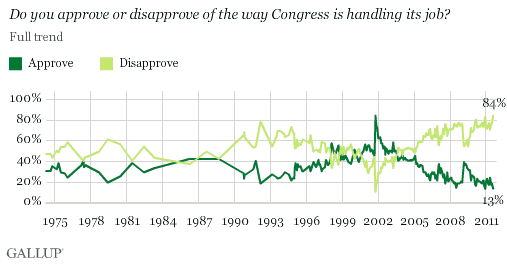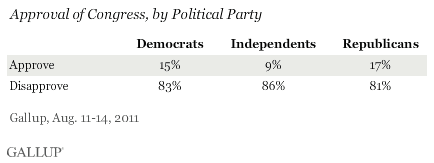PRINCETON, NJ -- Americans' evaluation of the job Congress is doing is the worst Gallup has ever measured, with 13% approving, tying the all-time low measured in December 2010. Disapproval of Congress is at 84%, a percentage point higher than last December's previous high rating.

These results are based on an Aug. 11-14 Gallup poll, which includes the first update on Congress' job approval rating since the government reached agreement on a deal to raise the debt ceiling after contentious and protracted negotiations between President Obama and congressional leaders. Standard & Poor's subsequently downgraded the United States' credit rating, in part citing the current political environment in Washington. That sparked a week of intense volatility in the stock market, with days of sharp losses and large gains.
Frustration with Congress was evident immediately after the debt ceiling agreement, with a record-low 21% of registered voters in an Aug. 4-7 USA Today/Gallup poll saying most members of Congress deserve re-election.
President Obama's job approval rating has also declined in recent days, reaching a low of 39% in Aug. 11-13 Gallup Daily tracking.
When Gallup last measured Congress' job approval rating in early July, 18% approved and 77% disapproved. That poll came while the debt ceiling discussions were underway but well before the talks dragged on to just before the Treasury Department's Aug. 2 deadline.
Congress' Ratings Go From Bad to Worse
Gallup has measured Americans' approval rating of Congress since 1974. Americans have not rated Congress very positively over this time, with an average approval rating of 34%.
Americans have in recent years become increasingly less charitable in their ratings of Congress, with average approval ratings of 19% in 2008, 2010, and 2011 to date. These ratings have come despite considerable turnover in the membership of Congress following the 2006, 2008, and 2010 elections.
In 2009, Congress averaged 30% approval coinciding with the election of a new presidential administration and with the Democrats in full control of Congress.
Independents are currently the most critical of Congress, with 9% approving and 86% disapproving. Republicans and Democrats give Congress slightly higher, but still overwhelmingly negative, marks.

Independents' current 9% approval rating of Congress is the lowest Gallup has measured for that group. The prior low was 13% on several occasions, most recently in December 2010.
Implications
Americans have usually not held Congress in high regard, but currently they have a more negative view of the institution than any other time Gallup has measured. Although Congress agreed to raise the debt ceiling, the issue is far from settled, as a special committee of 12 House and Senate members will work toward an agreement to make significant cuts in federal spending over the next few months to avoid mandatory cuts in defense and entitlement programs.
Though the results of that committee's work are not likely to dramatically transform the way Americans view Congress, they could determine whether the institution's ratings remain in this new lower range or show some improvement.
If Congress' ratings do not improve much before the November 2012 elections, its membership could be in line for another shake-up.Survey Methods
Results for this Gallup poll are based on telephone interviews conducted Aug. 11-14, 2011, with a random sample of 1,008 adults, aged 18 and older, living in all 50 U.S. states and the District of Columbia.
For results based on the total sample of national adults, one can say with 95% confidence that the maximum margin of sampling error is ±4 percentage points.
Interviews are conducted with respondents on landline telephones and cellular phones, with interviews conducted in Spanish for respondents who are primarily Spanish-speaking. Each sample includes a minimum quota of 400 cell phone respondents and 600 landline respondents per 1,000 national adults, with additional minimum quotas among landline respondents by region. Landline telephone numbers are chosen at random among listed telephone numbers. Cell phone numbers are selected using random-digit-dial methods. Landline respondents are chosen at random within each household on the basis of which member had the most recent birthday.
Samples are weighted by gender, age, race, Hispanic ethnicity, education, region, adults in the household, and phone status (cell phone only/landline only/both, cell phone mostly, and having an unlisted landline number). Demographic weighting targets are based on the March 2010 Current Population Survey figures for the aged 18 and older non-institutionalized population living in U.S. telephone households. All reported margins of sampling error include the computed design effects for weighting and sample design.
In addition to sampling error, question wording and practical difficulties in conducting surveys can introduce error or bias into the findings of public opinion polls.
View methodology, full question results, and trend data.
For more details on Gallup's polling methodology, visit www.gallup.com.
